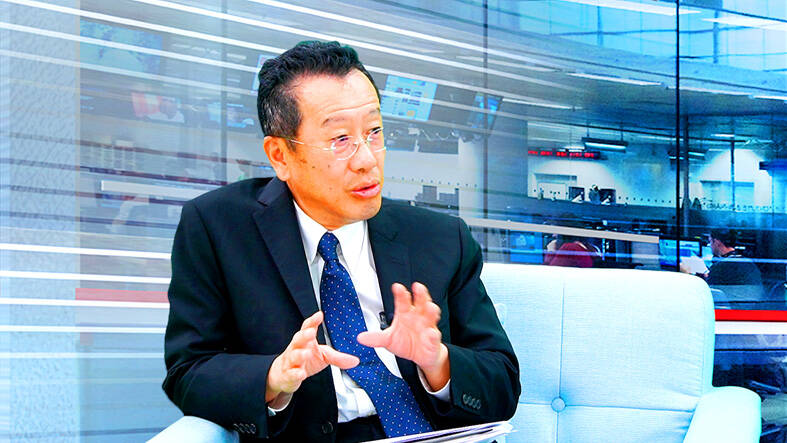This year’s Han Kuang military exercises will emphasize force preservation and homeland defense to stop the Chinese People’s Liberation Army (PLA) from crossing the Taiwan Strait, National Security Council Secretary-General Wellington Koo (顧立雄) said.
Koo made the remarks three days before the launch of the annual drills in an exclusive interview with the Chinese-language Liberty Times (the sister paper of the Taipei Times) that was posted online yesterday.
A key objective of this year’s exercise is to test the armed forces’ ability to survive a surprise attack by China with enough assets remaining to conduct counterstrikes, Koo said, adding that various methods would be used to gauge their effectiveness.

Photo: Chen Yun, Taipei Times
Another crucial aim of the drills is to boost homeland defense operations, including air defense and maritime joint interdiction capabilities, he said.
“Should we achieve these goals, we would able to prevent [the PLA] from crossing the Taiwan Strait,” Koo said.
The air force’s ability to persevere against enemy attacks and retain sufficient assets to contest Chinese air superiority would be an important aspect of the nation’s defense, he said.
The field exercises include repelling attacks by simulated Chinese airborne forces as the PLA’s preferred mode of attack appears to be helicopter-based air assaults instead of amphibious landings, Koo said.
“Defending Taiwan would not be a purely military endeavor, but also involve making use of civilian personnel and materiel,” Koo said, adding that this capability would be tested in the drills.
Asked about the sharp fall in the number of countries that recognize the nation’s sovereignty, Koo said Taiwan’s security depends on the international community’s recognition of the nation’s importance to the common good, not the number of diplomatic allies.
Taipei’s stance that Taiwan and China should not be subordinate to one another has gained traction in the international community in large part due to the understanding that Taiwan’s welfare is important to the common good, he said.
Despite Beijing’s claims, the world has rejected the position that the cross-strait situation is an internal issue and has come to recognize that changing the “status quo” by force or intimidation is utterly unacceptable, Koo said.

CHAOS: Iranians took to the streets playing celebratory music after reports of Khamenei’s death on Saturday, while mourners also gathered in Tehran yesterday Iranian Supreme Leader Ayatollah Ali Khamenei was killed in a major attack on Iran launched by Israel and the US, throwing the future of the Islamic republic into doubt and raising the risk of regional instability. Iranian state television and the state-run IRNA news agency announced the 86-year-old’s death early yesterday. US President Donald Trump said it gave Iranians their “greatest chance” to “take back” their country. The announcements came after a joint US and Israeli aerial bombardment that targeted Iranian military and governmental sites. Trump said the “heavy and pinpoint bombing” would continue through the week or as long

TRUST: The KMT said it respected the US’ timing and considerations, and hoped it would continue to honor its commitments to helping Taiwan bolster its defenses and deterrence US President Donald Trump is delaying a multibillion-dollar arms sale to Taiwan to ensure his visit to Beijing is successful, a New York Times report said. The weapons sales package has stalled in the US Department of State, the report said, citing US officials it did not identify. The White House has told agencies not to push forward ahead of Trump’s meeting with Chinese President Xi Jinping (習近平), it said. The two last month held a phone call to discuss trade and geopolitical flashpoints ahead of the summit. Xi raised the Taiwan issue and urged the US to handle arms sales to

BIG SPENDERS: Foreign investors bought the most Taiwan equities since 2005, signaling confidence that an AI boom would continue to benefit chipmakers Taiwan Semiconductor Manufacturing Co’s (TSMC, 台積電) market capitalization swelled to US$2 trillion for the first time following a 4.25 percent rally in its American depositary receipts (ADR) overnight, putting the world’s biggest contract chipmaker sixth on the list of the world’s biggest companies by market capitalization, just behind Amazon.com Inc. The site CompaniesMarketcap.com ranked TSMC ahead of Saudi Aramco and Meta Platforms Inc. The Taiwanese company’s ADRs on Tuesday surged to US$385.75 on the New York Stock Exchange, as strong demand for artificial intelligence (AI) applications led to chip supply constraints and boost revenue growth to record-breaking levels. Each TSMC ADR represents

State-run CPC Corp, Taiwan (CPC, 台灣中油) yesterday said that it had confirmed on Saturday night with its liquefied natural gas (LNG) and crude oil suppliers that shipments are proceeding as scheduled and that domestic supplies remain unaffected. The CPC yesterday announced the gasoline and diesel prices will rise by NT$0.2 and NT$0.4 per liter, respectively, starting Monday, citing Middle East tensions and blizzards in the eastern United States. CPC also iterated it has been reducing the proportion of crude oil imports from the Middle East and diversifying its supply sources in the past few years in response to geopolitical risks, expanding